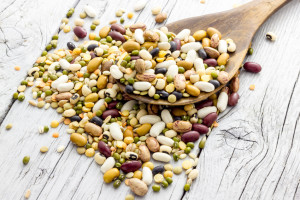2016 Is the International Year of Pulses!
What?? Are we celebrating having a pulse? That would be good, too, but no. Pulses are the edible seed of legume plants—dried beans, peas, lentils, etc. In 2013 the United Nations declared 2016 to be the International Year of Pulses, and I couldn’t be more excited the year has finally arrived!
So, why are pulses so important?
World population is growing (by 3 billion people over the next 40 – 50 years,) and with it is growing food insecurity. Pulses are a great source of protein. One acre of pulse crops can produce 94 pounds of protein while one acre devoted to beef only produces 15.6 pounds. And, they are dramatically more affordable. Dried beans cost an average of $1.07/lb. vs. $5.28 for beef (2014 U.S. prices.)
Meat production depletes land resources while legumes actually feed the land as they grow, pulling nitrogen from the air and fixing it into the soil. Legumes are widely used as cover crops and in crop rotation for this very reason. Pulse crops use significantly less water to produce than meat. Additionally, and alarmingly, meat production creates more greenhouse gases than transportation or industry.
Pulses to the rescue!
 Beans are growing in popularity in the United States. Growing up the only beans we ate were navy beans in the sweet barbecue side dish, baked beans, and split pea soup. Back then I never heard of hummus (made with chickpeas), but now it is a staple in my house and featured on menus everywhere. Black beans are my personal top favorite bean, but I love them all. And there are so many! Google “dried bean varieties” to see tons of beautiful beans...so lovely you’ll think they are precious stones.
Beans are growing in popularity in the United States. Growing up the only beans we ate were navy beans in the sweet barbecue side dish, baked beans, and split pea soup. Back then I never heard of hummus (made with chickpeas), but now it is a staple in my house and featured on menus everywhere. Black beans are my personal top favorite bean, but I love them all. And there are so many! Google “dried bean varieties” to see tons of beautiful beans...so lovely you’ll think they are precious stones.
But beans make me...you know…
Despite the old rhyme “Beans, beans, the musical fruit, the more you eat, the more you toot,” the more you eat, the more your digestive system adapts and the less gas beans will produce. Beans come loaded with iron, B vitamins, fiber, and much more besides just protein. Plus, they are such a great food bargain, they easily make up for any errant gas.
Afraid of cooking beans?
If you haven’t cooked dried beans, it can be intimidating. The internet is full of recipes and cooking instructions. Different beans cook at different rates. Keep notes as you try new varieties and remember: practice makes perfect. Consider investing in a pressure cooker. They are no longer the scary things your grandmother had. I love my pressure cooker! It cuts cooking to a fraction of the time and eliminates the need to soak the beans. Cook extra beans to freeze for later use to save even more time.
To get you started on your new great bean adventure, here is one of my favorite dishes I call Greek-Inspired Lima Bean Stew. It is never exactly the same each time I make it. Stews and soups are very forgiving that way. :)
- 1 lb dried lima or other large white beans, cooked, reserve cooking water. (I’ve use frozen and canned in a pinch.) My favorite bean to use is the Greek gigande, meaty and delicious. Find them in specialty stores.
- Lots of tomatoes – canned, fresh, frozen, sauce, or any combination thereof. In the winter I use two 16 oz containers of frozen garden tomatoes.
- Large onion, chopped (more if you like)
- Few cloves of garlic, chopped (more if you like)
- BIG bunch of greens, fresh or frozen (spinach, kale, collards, beet, etc.)
- Other vegetables (carrots, celery, zucchini, turnips, peppers, etc.) as desired
- 2 – 3 tablespoons of chopped fresh basil
- ½ teaspoon or so to taste dry oregano (if using fresh chopped oregano, multiply by 3)
- Salt and black pepper to taste (I like to add a little pep with some cayenne pepper)
- Red wine—a few glugs
- Feta cheese to top when serving
Sauté onion, garlic, and other vegetables in olive oil until just tender. Add tomatoes and bean liquid (to desired thickness,) cook 10 min or so. Add basil, oregano. Add greens, cook until just tender. Add red wine (great flavor enhancer and the alcohol cooks off,) salt and pepper, cook 5 or so more minutes. Stir in cooked beans, heat through.
Serve with feta cheese. Add cooked whole wheat pasta to complete your protein, if you like. Yum! Freezes well.
Share your favorite pulse and recipes in the comments section!
 Author Mary Ellen Kaluza is a Certified Financial Counselor with LSS Financial Counseling. She specializes in budget/debt counseling and financial education. Plus, she is our resident gardening and frugality queen!
Author Mary Ellen Kaluza is a Certified Financial Counselor with LSS Financial Counseling. She specializes in budget/debt counseling and financial education. Plus, she is our resident gardening and frugality queen!
For more ideas to save money, read a couple other of Mary Ellen's posts: "6 laundry tips to save money and your clothes" and "3 Frugal Tips from a Lover of Frugality".
For more information about our services, visit our website: ConquerYourDebt.org.
